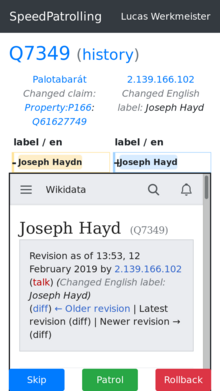User:Lucas Werkmeister/SpeedPatrolling

SpeedPatrolling is a tool to make patrolling easier. It is primarily intended for mobile use, and does not aspire to cover all patrolling use cases: rather, it is meant to simplify some common patrolling tasks, reducing the overall patrolling backlog and thus giving other patrollers, possibly using more powerful tools, the opportunity to focus on the more complicated cases.
Usage[edit]
After logging in, follow the start link on the tool’s main page to load an unpatrolled recent change. You will see the diff of the edit, as well as the state it left the page in, i. e. the page as of that revision. Inspect the edit and decide which of the following actions you want to take:
Skip[edit]
This is the safest option, and you are encouraged to use it whenever you’re not confident that you can fully handle the edit you’re shown. All it does is tell the tool that you would like to not see this change again, and then load another unpatrolled recent change.
Try not to think of this as “giving up“ on the edit: you’re just leaving it for someone else to handle. Valid reasons to choose this option include:
- The edit is well-intentioned but requires further action. For example, many new editors add English descriptions beginning in uppercase letters; those edits should be patrolled, but the descriptions should also be fixed to begin with a lowercase letter, and perhaps a message should be left on the editor’s talk page. You can leave that to someone who’s not using a touch keyboard.
- The edit seems innocuous, but you have no idea if it’s correct or not, and would like someone else to take a look.
- The edit is in a language you do not understand, and is neither obvious vandalism nor obviously correct.
- The edit is vandalism, but you’re not a rollbacker (see below).
- The edit is vandalism but requires further cleanup beyond a rollback.
- The edit is incorrect but not vandalism, so a rollback would be rude. Let someone else write a friendly “undo” message.
If you skip more than one revision of the same page and haven’t otherwise acted on the page (i. e. patrolled or rolled back any other revision on it), then the tool will guess that you can’t judge other revisions on this page either, and will stop showing you that page for a while. Similarly, if you skip revisions of the same user on more than one page and haven’t otherwise acted on revisions by that user, the tool will stop showing you revisions by that user for a while.
Patrol[edit]
This marks that edit as patrolled. You can find more information on what this means at Wikidata:Patrol, but basically, you’re saying that this edit does not require further attention.
In the case of this tool, you should only mark edits as patrolled if they’re correct, because this tool does not provide you with the means to otherwise bring the page to a state where it no longer requires further attention (e. g. clean up minor issues and then mark as patrolled, or undo the vandalism edit and then mark as patrolled). Otherwise, just skip the edit and leave it to someone else.
Rollback[edit]
This option is only available if you are a rollbacker. That right is not given out automatically, so in theory if you have it you should know how to use it, but in short, a rollback reverts all the consecutive edits the user made to a page and also marks them all as patrolled. You should only use this to revert vandalism: responding to well-intentioned mistakes this way is rude, since there’s no way to include any kind of message with the rollback.
If you would like to become a rollbacker so that you can revert vandalism using this tool, you may request the right at Wikidata:Requests for permissions/Other rights#Rollbacker.
Settings[edit]
The tool also has a settings page, where you can tell it which scripts you are able to read. If you save this setting, then from that time onward the tool will skip showing you edits that you can’t read (e. g. descriptions written in languages not using those scripts, or Commons media file names using other scripts). Note that this is only based on the script, not on the language, since being able to read the script is often sufficient to judge the edit as obviously correct (labels for people’s names, sitelinks matching the label, etc.) or obvious vandalism (gibberish, special character soup, etc.). However, if you find that you cannot judge an edit because you do not understand the language, feel free to just skip it.
When you load the settings for the first time, the initial selection of scripts is guessed from your Babel, but no filtering by script is actually applied until you save the setting for the first time, either with that selection of scripts or with a different one.
Monitoring[edit]
You can see all the actions made using this tool since on the recent changes (rollbacks) and the patrol log (patrols).
For actions prior to (when the tool switched OAuth consumers for the toolforge.org migration), use these recent changes and patrol log links instead. (Note that patrol log entries are only tagged by OAuth consumer since , see T219655.)